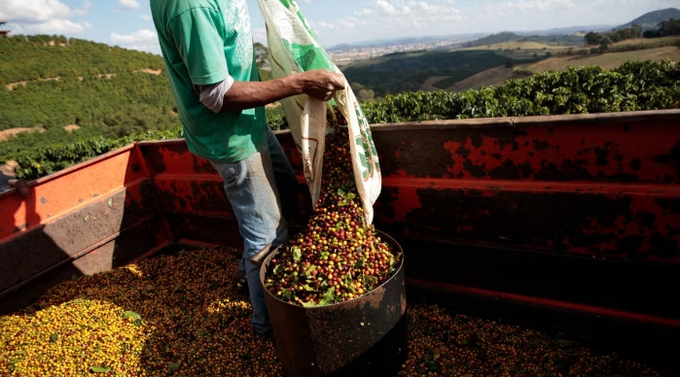November 25, 2025 | 22:42 GMT +7
November 25, 2025 | 22:42 GMT +7
Hotline: 0913.378.918
November 25, 2025 | 22:42 GMT +7
Hotline: 0913.378.918

An EU ban on the import of commodities linked to deforestation would affect Brazilian exports of products including coffee, palm oil and cocoa © Patricia Monteiro/Bloomberg
The head of the World Trade Organization has asked Brussels to “relook” at a ban on imports from deforested areas that has angered dozens of countries, increasing pressure on the European Commission over the landmark legislation.
Exports of wood, soya and coffee are among the products affected by the new rules, which are due to start on December 30.
Ngozi Okonjo-Iweala said the EU had not yet issued clear compliance guidelines, leading to uncertainty for exporters who did not know if their goods would be stopped at its borders.
“I want to give the EU credit for listening, coming in and engaging and listening to other members. And I hope that they use the feedback that they’ve got here to relook at the system,” she told the Financial Times in an interview, adding that many G20 leaders had raised the issue with her.
She gave the example of farmers in Nigeria, her home country. They leave land fallow to regenerate for up to 10 years. They then clear any trees to plant crops.
“Is that deforestation? How do we take this into account? Those are the tricky problems that the purchasers have to deal with because they have to certify that the farmers they’re buying from have not deforested.”
EU officials have indicated that the commission is considering a delay to the overall implementation or a simplification of the rules. But this would require reopening the legislation, which some officials fear could create a bigger political fight.
Okonjo-Iweala’s intervention came as Brazil asked Brussels for a delay to the “unilateral and punitive” rules, which would cover about a third of its exports to the EU.
In an effort to prevent European consumers from contributing to global deforestation, commodities and products from the sectors covered that originate from deforested land will be banned from the bloc. The rules also cover other commodities such as palm oil, cocoa and rubber. In a letter sent on Thursday Mauro Vieira and Carlos Fávaro, Brazil’s foreign affairs and agriculture ministers respectively, requested that the EU delay implementation of the law, due to come into force on December 30, and “urgently reassess its approach”.
“We consider the EU Deforestation Regulation to be a unilateral and punitive instrument that disregards national laws on combating deforestation,” the ministers wrote.
The commission declined to comment on the Brazilian letter but said it would reply “in due course”.
Brazil and Colombia have asked for a debate on the measure at the WTO. They intend to put pressure on the EU, one official said. But neither country has yet initiated a formal complaint. Pascal Canfin, an MEP who was former chair of the European parliament’s environment committee, called on Brazil to speed up moves to ban deforestation.
“Brazil finds the deforestation regulation problematic since it covers one-third of its exports linked to deforestation. It is up to Brazil to ban deforestation, not the EU to change its rules,” he said in a post on X.
But Bernd Lange, chair of parliament’s trade committee, on Thursday urged the commission to publish guidance “urgently” and consult trading partners. Brazil’s complaint echoes the concerns of others including the US, which said in June that the law presented “critical challenges” to American timber, pulp and paper producers.
Diplomats from countries in Latin America and south-east Asia, which are leading exporters of commodities such as coffee and palm oil, have also pushed back against the EU’s system of grading countries. One described the benchmarking system, where countries would be assigned a “high”, “standard” or “low” deforestation risk, as a “political instrument” that allowed the commission to choose which countries had increased access to the European market.
Brussels has already delayed the start of the strict benchmarking system, instead deciding to categorise all countries initially as “standard risk”.
Commission president Ursula von der Leyen said in July that Brussels should “listen and respond better to the concerns of our partners”, particularly in the area of climate and environmental laws.
(FT)

(VAN) Brazil's COP30 presidency pushed through a compromise climate deal on Saturday that would boost finance for poor nations coping with global warming but that omitted any mention of the fossil fuels driving it.

(VAN) Poultry farmers in the UK have been warned that they could face one of the worst winters yet for bird flu.

(VAN) Prices of main-crop paddy have risen sharply, with jasmine rice hitting 16,100 baht per tonne — the highest level in years.

(VAN) In Brazil, FAO unveiled a series of reports and initiatives showing how sustainable agrifood systems are a solution to the climate crisis.

(VAN) With names like neodymium and dysprosium, rare-earth elements sound exotic — and their perceived scarcity has only added to the mystique.

(VAN) In a new study published in Trends in Biotechnology, researchers used a gene-editing technology called CRISPR to increase a fungus's production efficiency and cut its production-related environmental impact by as much as 61%- all without adding any foreign DNA.

(VAN) A top official in Beijing’s Cop delegation says China is committed to clean energy – but US’s absence is a problem.